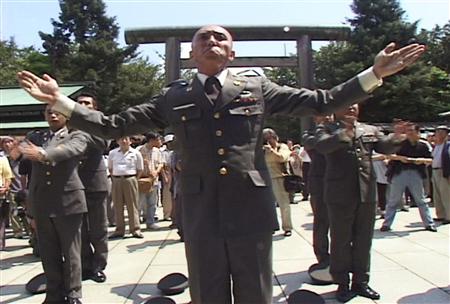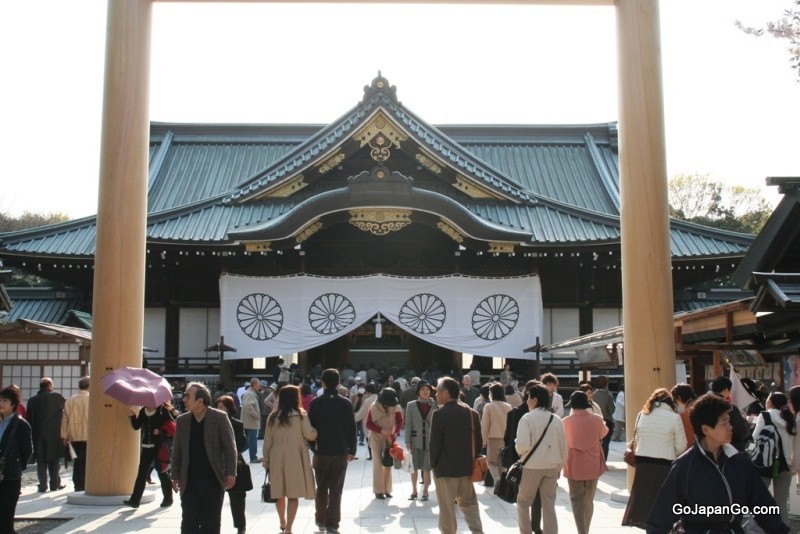
War glorification at Yasukuni (picture from K. Onodera blog)
The unfortunate alliance of Shinto with right-wing nationalism is nowhere more evident than in the cult of Yasukuni Shrine, established in the nineteenth century to honour those who died on behalf of the emperor. Defenders of the shrine like to pretend worshippers are simply honouring Japan’s war dead, as is the custom in other countries. But anyone familiar with the shrine will know that it is a symbolic space championed by the far right and those who uphold Japan’s role in WW2 and deny its atrocities. Personally I find the shrine’s museum absolutely repellent, and I say that as someone who normally loves Japan and the Japanese.
Yasukuni has been much in the news in the past few days because of visits by Japanese politicians to the shrine, which honours Class A war criminals. It’s a deliberate and unnecessary act of provocation by nationalists at a time when relations with China and Korea hardly need fuel adding to the flames. If Japan had any kind of government that wasn’t leaning over itself to prove its nationalist appeal, then it would have long ago instigated visits to honour the war dead at the equivalent of Arlington Cemetery rather than a nationalist shrine that stood (and still stands) at the heart of its war ideology.
*********************************************************************************
Article from yesterday’s Guardian by Justin McCurry (18, Oct, 2012)
http://www.guardian.co.uk/world/2012/oct/18/japanese-mps-war-shrine-china-korea
A cross-party group of more than 60 politicians took part in an autumn festival at Yasukuni shrine on Thursday, following a similar visit on Wednesday by Shinzo Abe, the new leader of the Liberal Democratic party, who is widely tipped to become Japan’s next prime minister.
Hong Lei, a Chinese foreign ministry spokesman, told reporters in Beijing: “Yasukuni shrine is a spiritual pillar used by Japanese militarism for its overseas aggression. It still enshrines class-A war criminals who owe victimised people heavy bloody debts.
“We urge the Japanese side to face squarely and reflect upon history and strictly abide by its solemn statements and pledges regarding historical issues, and face the international community in a responsible manner.”

Former prime minister Koizumi, who made a deliberate point of visiting Yasukuni and thereby riled Japan's neighbours
The pilgrimages, made to coincide with the shrine’s autumn festival, are expected to increase tensions between Japan and China, which are already embroiled in a dispute over territorial claims to the Senkakus, a group of islands in the East China Sea known as the Diaoyu in China.
The Yasukuni visit also drew an angry response from South Korea amid friction over ownership of the Takeshima – or Dokdo – islands, and renewed pressure on Japan to issue an official apology for its use of Korean women as sex slaves in frontline brothels during the war.
Cho Tai-young, a South Korean foreign ministry spokesman, said the visit was “an irresponsible act that ignores the sentiment of the peoples in neighbouring countries who suffered due to Japan’s past imperialism”, according to Kyodo News.
“The South Korean government calls on Japan’s political leaders in a responsible position to look squarely at history with a humble attitude.”
Japan’s chief cabinet secretary, Osamu Fujimura, refused to condemn or support the lawmakers, who included the transport and postal reform ministers. “A visit in a private capacity is a matter of the personal belief of individuals,” Fujimura said.
Yasukuni honours the 2.5 million Japanese to have died in wars since the second half of the 19th century. Among them are 14 class-A war criminals convicted by the Allies after the war, including Japan’s wartime prime minister, Hideki Tojo, who was executed for war crimes in 1948.
Many Koreans and Chinese view the shrine as a symbol of Japanese militarism, and visits by politicians as proof that Japan has yet to atone for its wartime conduct in parts of China and on the Korean peninsula.

Yasukuni on a normal day, without nationalists or politicians (photo from GoJapanGo.com)

Hi there, I enjoy reading through your article.
I wanted to write a little comment to support you.